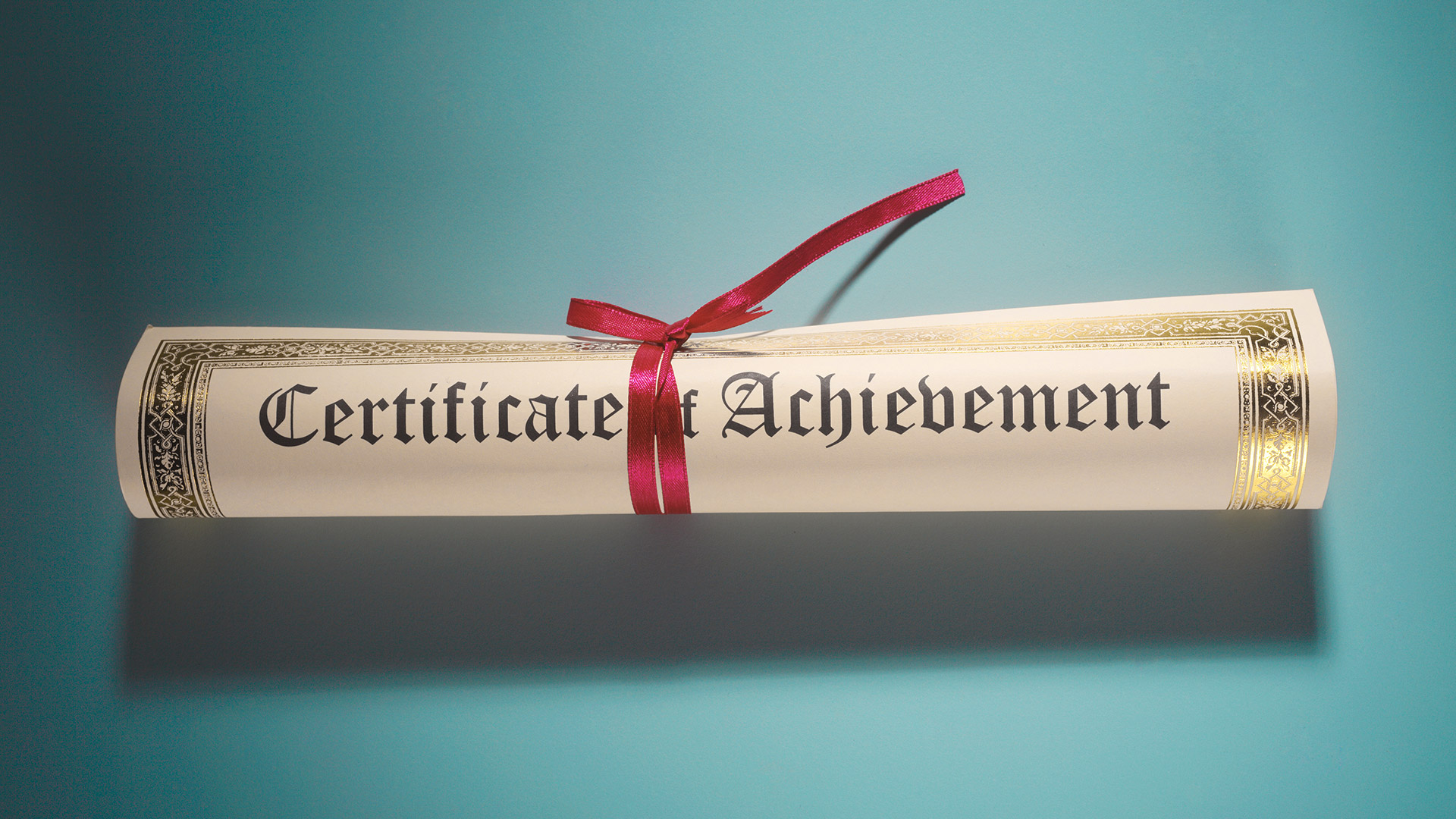You Are Certifiable
There’s this dumb thing that happens in business. It’s the situation where everyone at the table is talking about something, and you just nod along with the conversation because you don’t want the others to think you’re dumb. Everyone does it to some extent. It’s not your fault really, it’s typically the fault of the messenger, the presenter if you will.
And I hate that.
I really hate it when, as speakers, we’re insensitive to some portion of the audience who really could use the message, but it was delivered in a way that incorrectly assumes prior knowledge. It’s a waste of everyone’s time and a missed opportunity.
And this is an opportunity I don’t want you to miss.
 So let’s talk about “Certs,” the certifications that the Guild newsletter and website have been making so much noise about lately.
So let’s talk about “Certs,” the certifications that the Guild newsletter and website have been making so much noise about lately.
We formed the Presentation Guild to help give recognition and credibility to presentation professionals worldwide. We found that recognition was almost non-existent. At best, it was assumed that presentation professionals were just kind of “dumber graphic artists.” There was never a survey checkbox that applied to what we did, and even when there was a fill-in-the-blank box, we didn’t know exactly what to fill in. So we’re working on that name thing. But label recognition is a slippery beast and takes time to spread.
Credibility is a little easier to get a grip on.
Basic credibility is earned one-on-one. You have a job for someone; you do it well, they’re happy, and voilà! Credibility!
The problem is you’ve only established credibility with one individual. You can hope that person passes along your name, recommends you, and remembers to re-hire you in the future should the need come along. But the chances of that are… well, chancy. And with the passing of time, the chances just get worse.
And before all that, how do you even get the opportunity to establish credibility with a stranger? Entice them by dropping your rates? Promise a painfully short turn-around? Work for free?
Interruption here: Never Work For Free. Never work for experience, exposure, or friendship. You’re a professional, and professionals get paid. It’s really hard to raise your rate from “free.” So don’t go there. Don’t. Write to me directly if you need help talking yourself out of it. Seriously, do not work for free. Get paid.
So where were we? Oh yes, establishing credibility with a stranger.
How do you pick an accountant, a plumber, or a doctor? First, you ask friends for a recommendation, which is all fine and well, but it depends on having a friend who was in the same situation as you were and, more importantly, finding someone who was able to meet their needs. Next, you look for the recommendations of strangers. Check out Yelp reviews. Subscribe to Angie’s List. Yes, those will get you started, but you can still pull a lemon out of a bin marked oranges. So, how do you avoid the lemons?
Well, you ask for credentials: licenses, diplomas, and certifications.
As a presentation professional, you should have a general business license. That’s typically a registration with your city of your small (or not-so-small) business. Super straightforward.
Diplomas are interesting, sometimes surprisingly misleading, and something we’ll just skip over here. Although I will mention that you can likely find a credible university that will let you define a curriculum of study and define your own master’s degree. It’s been done.
So, that leads us to the aforementioned certification. A certification is relatively simple to explain. It’s like a very specific diploma, one that verifies that you have been tested and passed a relatively narrow area of study; an area like knowing how to create a good presentation document.
Certification programs are constructed, administered, and maintained by an organization of experts in the field. Again, credibility is established by the organization offering the certification. And certifications are often provided in levels, like Specialist, Expert, and Master, each one representing a more complex and involved level of ability. Depending on their need, and a good definition of what each level represents, the person hiring a Certified Presentation Professional should have a good and verified idea of your abilities and capabilities.
So, let’s tie that all back into the Presentation Guild Certification process.
Anyone can become certified. They just have to have experience and pass a test.
OK, it’s slightly more complex, but only slightly. There are administrative fees you must pay to take the test, which differ based on your situation, so we’ll skip that for now. More importantly, there is a free guide to the standards used to create the tests. This is called the Presentation Industry Professional Standards. This document literally lists the areas you should know to be able to pass each level (Specialist, Expert, and Master) of the certification test.
Let me repeat that. The Presentation Industry Professional Standards document lists the areas you should know to pass each test. You still need to study, but these lists tell you exactly what to study and practice.
The Presentation Industry Professional Standards document is doubly important because it defines for employers what each level of certification entails and helps them understand if you, as a certification holder, are right for the job they’re looking to fill. It really is that simple. Oh yeah, there is the actual learning of the subject matter listed, but taken one-by-one, it’s pretty straightforward to find that information from a number of good and free sources.
So, you review, study, and decide, on your own, when it’s time to take the test.
But wait, there’s another optional step here. You can purchase a practice test. A short form of the actual certification test, this gives you a chance to see how questions will be posed in the actual multiple choice test. It gets scored like the normal test, and you get to hear if you passed or failed.
Important Note: At no time will any graded certification test materials, practice or actual, be returned to you. You will only hear if you passed or failed. This is to protect the security of the test.
The actual certification exam also requires you take a practical test. In this test you will be given (via download) a number of pre-constructed slides and instructions to modify or fix some aspect of them. This is the practical exam, and when you’re done working on it you upload the slides back to us for review and scoring.
Both of the tests are composed of a random selection of questions or tasks from a much larger collection of tasks. So no two people are at all likely to take the same test, although there might be overlap.
OK, there’s more detail on the tests on the Certifications page in the Presentation Guild website. But let’s leave that for now and cover the cool stuff next.
So you’ve passed your certification tests. You’re certified now. You can print out your certificate from the credentialing page, frame it, and hang it on your wall.
But when you pass your certification, there’s a lot more you can do. Let’s say you passed the Presentation Specialist certification. You can use that label anywhere you want. You can use it on business cards, your website, the door to your office… anywhere. You can even put the credential initials after your name (i.e. Ric Bretschneider, CPS).
And you also get this cool thing called a Badge. This is a mechanism you can put on your web page, or link out of your LinkedIn page, that actually verifies your credential. This can’t be faked; it links back to a database of credentialed professionals, and when someone checks you out, they can see each and every one of your certifications.
You’ve just gained the power to establish credibility with strangers. Nice huh? Better than a Yelp review (you know most of those are done by family members and Russian robots, right?)
So, are Presentation Guild Certifications right for you? If you’ve read this far, the answer is probably yes. But convince yourself first. Check out the Certifications page on the website for more detail and for specifics on taking the test and maintaining your certification. Remember, you don’t have to take all the certifications at once. Actually, you can’t right now because we’re still constructing the Expert and Master level tests. So start with Specialist and see how it goes.
And be sure to send feedback on your experience. Just as with any Guild activity or resource, we’re constantly looking to improve and to provide you with the tools you need to be a better and better-paid presentation professional.
